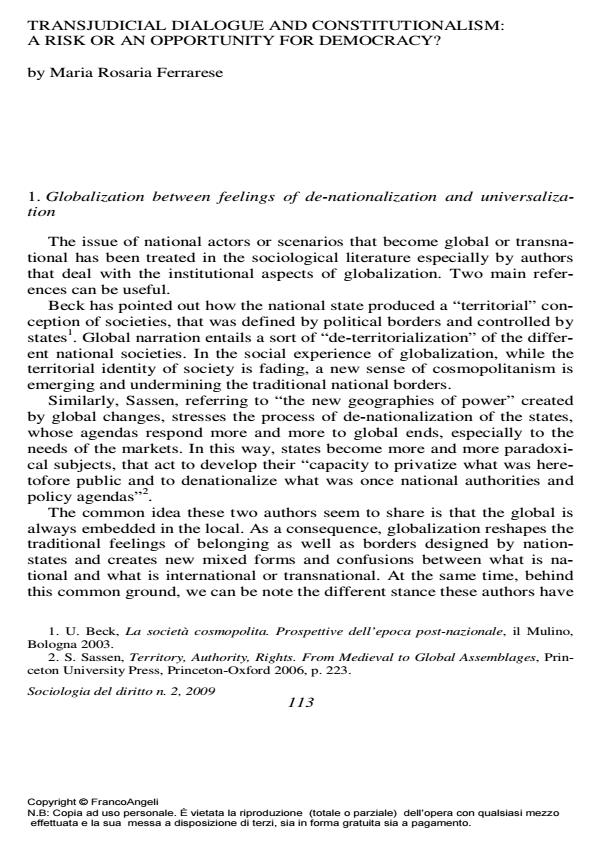Transjudicial dialogue and constitutionalism: a risk or an opportunity for democracy?
Journal title SOCIOLOGIA DEL DIRITTO
Author/s Maria Rosaria Ferrarese
Publishing Year 2009 Issue 2009/2 Language Italian
Pages 26 P. 113-138 File size 354 KB
DOI 10.3280/SD2009-002008
DOI is like a bar code for intellectual property: to have more infomation
click here
Below, you can see the article first page
If you want to buy this article in PDF format, you can do it, following the instructions to buy download credits

FrancoAngeli is member of Publishers International Linking Association, Inc (PILA), a not-for-profit association which run the CrossRef service enabling links to and from online scholarly content.
Transjudicial Dialogue and Constitutionalism: A Risk or an Opportunity for Democracy? - After briefly explaining how constitutional dialogue works and has mostly been elaborated, together with how it is encouraged and made possible by some of the institutional characteristics of the judiciary, this paper addresses a specific issue: the link between the position adopted by the courts with regard to this practice and the different kinds of legitimisation which they refer to, whether democracy or constitutionalism. Legitimacy may be based more on democracy, with the idea that national sovereignty is its almost exclusive source, or on the idea that, in matters of rights, universal standards may or must pass through different democracies. As usual parlance is of course about "constitutional democracies", it reconciles the potential opposition between the two aspects. However, globalisation, with the challenges it sets towards national sovereignty, is strengthening this opposition, pushing it toward the one or the other aspect. Courts and especially constitutional courts are thus becoming the places where decisions are made about the ambivalence between the risk of de-nationalising national constitutional law and the opportunity to take part in creating new cosmopolitan forms of law and universalising a constitutional protection of fundamental and human rights. Two possible answers to this ambivalence are highlighted by focusing particularly on the example of two national constitutional courts, that of South Africa and that of the United States, starting from their different attitudes towards involvement in the constitutional dia- logue. Their different, even opposite, ways of approaching transnational dialogue lead to paradoxical results.
Maria Rosaria Ferrarese, Transjudicial dialogue and constitutionalism: a risk or an opportunity for democracy? in "SOCIOLOGIA DEL DIRITTO " 2/2009, pp 113-138, DOI: 10.3280/SD2009-002008